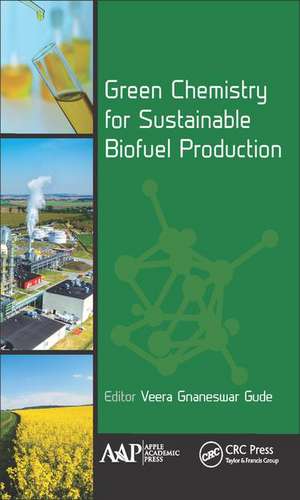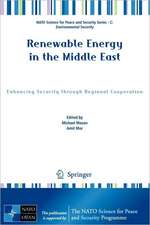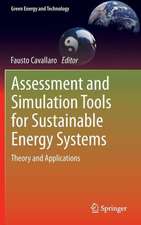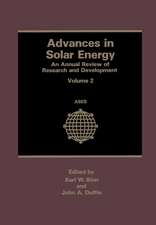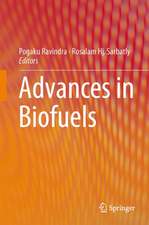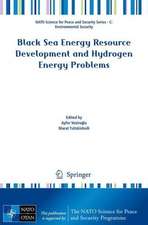Green Chemistry for Sustainable Biofuel Production
Editat de Veera Gnaneswar Gudeen Limba Engleză Hardback – 24 mai 2018
The book offers an abundance of scientific experimental methods and analytical procedures and interpretation of the results that capture the state-of-the-art knowledge in this field. The wide range of topics make this book a valuable resource for academicians, researchers, industrial practitioners and scientists, and engineers in various renewable energy fields.
Key features:
• Emphasizes green chemistry and green engineering principles for sustainable process development for biofuel production
• Discusses a wide array of biofuels from algal biomass to waste-to-energy technologies and wastewater treatment and activated sludge processes
• Presents advances and developments in biofuel green chemistry and green engineering, including process intensification (microwaves/ultrasound), ionic liquids, and green catalysis
• Looks at environmental assessment and economic impact of biofuel production
| Toate formatele și edițiile | Preț | Express |
|---|---|---|
| Paperback (1) | 503.90 lei 43-57 zile | |
| Apple Academic Press Inc. – 31 mar 2021 | 503.90 lei 43-57 zile | |
| Hardback (1) | 1028.77 lei 43-57 zile | |
| Apple Academic Press Inc. – 24 mai 2018 | 1028.77 lei 43-57 zile |
Preț: 1028.77 lei
Preț vechi: 1254.59 lei
-18% Nou
Puncte Express: 1543
Preț estimativ în valută:
196.86€ • 206.05$ • 163.85£
196.86€ • 206.05$ • 163.85£
Carte tipărită la comandă
Livrare economică 31 martie-14 aprilie
Preluare comenzi: 021 569.72.76
Specificații
ISBN-13: 9781771886390
ISBN-10: 1771886390
Pagini: 614
Ilustrații: 47 Tables, black and white; 12 Illustrations, color; 127 Illustrations, black and white
Dimensiuni: 156 x 234 x 38 mm
Greutate: 1.28 kg
Ediția:1
Editura: Apple Academic Press Inc.
Colecția Apple Academic Press
ISBN-10: 1771886390
Pagini: 614
Ilustrații: 47 Tables, black and white; 12 Illustrations, color; 127 Illustrations, black and white
Dimensiuni: 156 x 234 x 38 mm
Greutate: 1.28 kg
Ediția:1
Editura: Apple Academic Press Inc.
Colecția Apple Academic Press
Public țintă
Academic and PostgraduateCuprins
Green Chemistry and Engineering for Sustainable Biofuel Production. Biofuel Feedstock: Challenges and Opportunities. Fuels from Recycled Carbon. Green Catalysts and Catalytic Processes for Biofuel Production. Process Intensification and Parametric Optimization in Biodiesel Synthesis Using Microwave Reactors. Process Intensification and Parametric Optimization in Biodiesel Synthesis Using Hydrodynamic Cavitation Reactors. Hydrothermal Processes for Biofuel and Bioenergy Production. Sustainable Biofuels and Chemicals Production Using Ionic Liquids. Algae as a Sustainable Feedstock for Biofuel Production. Bioenergy from Activated Sludge and Wastewater. Bioelectrochemical Systems for Biofuel (Electricity, Hydrogen, and Methane) and Valuable Chemical Production. Energy Balance/Efficiency and Economic Analysis of Biofuel Production. Techno-Economic Analysis of Microalgae and Algal Biofuel Production (as a Tool for Driving R&D Efforts). Mismatch of Life-Cycle Inventories for Bioenergy, Fossil Fuel, and Agricultural Resource Production.
Notă biografică
Veera Gnaneswar Gude, PhD, is an Associate Professor of Civil and Environmental Engineering at Mississippi State University (MSU). A prolific author of journal articles, book chapters, and more, he has over 15 years of academic, research, and industrial experience in biofuels, desalination, and water/wastewater treatment in scientific and technological areas. He has delivered many invited lectures, keynote speeches, and scientific research and educational presentations. He has organized many workshops on water-energy-environment nexus topics at national and international conferences and was the chair and board representative for the clean energy and water division of the American Solar Energy Society between 2011 and 2016. He is a member of several editorial boards and editor for many scientific journals, including ASCE Journal of Environmental Engineering. His research is supported by many organizations, including NSF, USEPA, USGS, USDA, and many industrial and international agencies.
Recenzii
"This invaluable book provides detailed information on the green chemistry reaction pathways and engineering principles, addressing the main issues and various technologies that are essential for transforming renewable and alternative feedstocks to carbon neutral biofuels. The editor and authors are to be commended for constructing this high quality collection that will be greatly useful for engineers, researchers, scientists, and industrial professionals to develop a robust synergy between bio- and oil refineries. The catalytic and non-catalytic green process advancements and engineering breakthroughs demonstrated in this volume are the essential building blocks to solve the scale-up challenges in the commercial biofuel production. A sustainable platform for production of value-added bioproducts such as bio-based chemicals, solvents, polymers, and lubricants are also discussed for creating new revenue streams, market opportunities, and cost savings in the conversion of biomass to green refinery transportation blendstock. Apart from the technological information on biofuels, the book also deals with the economic feasibility aspects, energy efficiency analyses, life-cycle assessment, and biorefinery-based revolutionary approaches for sustainable production of high quality biofuels."
—Prafulla D. Patil, PhD, Research & Development Engineer, American Refining Group, Inc., Bradford, Pennsylvania
—Prafulla D. Patil, PhD, Research & Development Engineer, American Refining Group, Inc., Bradford, Pennsylvania
Descriere
This important volume addresses biofuel feedstock challenges and potential and renewable fuels from carbon sources; process intensification and green chemistry through microwave irradiation, hydrodynamic cavitation, hydrothermal processes, and using ionic liquids; evaluation of nonconventional and emerging sustainable feedstock, such as microalgae, oleaginous microorganisms from wastewater sludge, and biorefinery configurations using bioelectrochemical systems as central technology; and energy-efficiency analyses, techno-economic aspects and life-cycle impacts, and inventories of various biofuel production processes.
